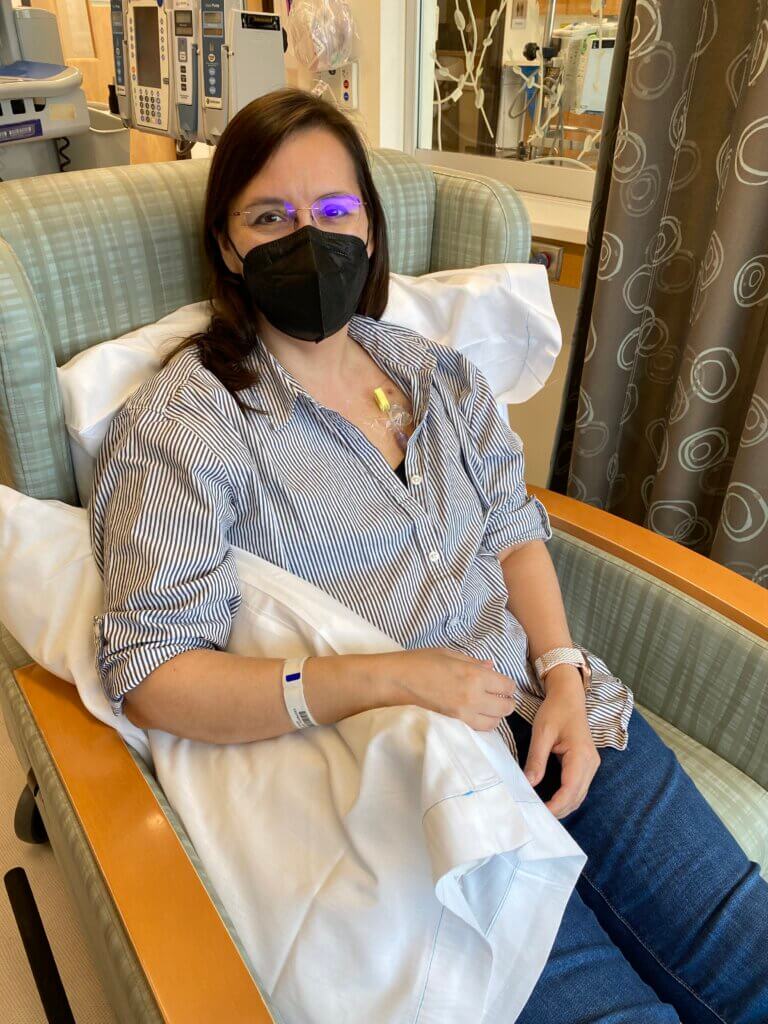ctober is National Breast Cancer Awareness Month. Breast Cancer is one of the most frequently diagnosed cancer and leading cause of cancer mortality among American Indian/Alaska Native (AI/AN) women. #TananaChiefs is committed to spreading awareness of the importance of early detection and treatment. Today, we will share one story for Breast Cancer Awareness month.
Stephanie Hinz is Tanana Chiefs’ Education & Indigenous Learning Manager. While conducting a breast self-exam, she noticed a lump in her breast in December of 2021, and mentioned it to her provider at her January checkup. “My doctor wasted no time,” Stephanie recalls. “Mammograms, ultrasounds, biopsies followed.” Two months after discovering the lump, Stephanie was met with the news of her diagnosis: invasive ductal carcinoma, which is a type of breast cancer that starts in the milk ducts of the breast and moves into nearby tissue. Within ten days, she underwent a mastectomy and breast reconstruction.

Stephanie Hinz receiving her first chemotherapy treatment for Stage 2, grade 3 breast cancer earlier this year.
The labs from that surgery informed her case even further. The stage of the cancer was labeled as 2B, meaning it had spread to 1 of 7 lymph nodes removed during the procedure; the cancer was also given a grade 3. This meant that the cancer was fast growing. “I was stunned,” Stephanie recalls. “My past providers have joked that I am ‘abnormally normal’ in regard to my health. I’ve never smoked, rarely drink alcohol, have never taken drugs and am not overweight. Yet, now I am 1 of 8 women who get diagnosed with breast cancer.”
Her biggest question was that of her survival. However, Stephanie’s two sons, plus her siblings and extended family have been incredibly supportive. “My two sons, age 17 and 20 at the time, my mother, my siblings and their spouses arranged meal trains and helped manage medication and appointments,” shared Stephanie. “My sons helped me with household chores, took over much of the cooking, and all of the shopping. They helped me stay centered.” Co-workers also stepped forward to support her by donating hours of leave so she could focus on her healing, and acquaintances delivered meals and brought gifts. “I am still incredibly grateful for all the support I received,” she states.
Stephanie’s battle with breast cancer has included complications from the reconstructive surgery, 16 rounds of chemo and the side effects, and a COVID-19 diagnosis. “I got a buzz cut,” she remembers, “and despised the feel of the wind or a hoodie on my short hair. A lint roller helped me manage the hair when it began to fall out.”
The next phase of her journey includes one more procedure, and radiation therapy in the coming months; and years of hormone therapy. “I have learned a few things from this experience,” Stephanie says. “I can cope with more than I ever thought possible. Focusing on what is within my control has helped me manage expectations and emotions. Support will come from unexpected places — co-workers, acquaintances, and strangers.” She cites “Fight Song” by Rachel Platten as her anthem on this journey.
“Ask for what you need,” Stephanie advises people who are diagnosed and undergoing treatment. “Learn to listen to your body; it sets the limits now, not your mind.”
Stephanie’s resiliency and determination to turn her experience into a learning platform for everyone is evident in the way she shares her story. “I know not everyone wants to share their cancer story,” she says, “but I think it’s important that people understand that breast cancer probably has impacted someone they know — even if remotely.”
“I am looking forward to the day when I am cancer free and can celebrate being a survivor,” she says in closing.
So are we.
